HNC Healthcare: Leadership Theories Application in Healthcare
VerifiedAdded on 2023/06/15
|7
|1082
|222
Report
AI Summary
This report delves into various leadership theories and their application within healthcare practice, emphasizing their importance in achieving quality care and safe facilities. It discusses transformational leadership, strength-based leadership, and exchange theory, highlighting how these theories can align management styles with different healthcare contexts. The report further assesses the benefits of applying these theories to the practical operational management of teams in healthcare settings, focusing on care worker development and motivation. It concludes that effective leadership, grounded in these theories, is crucial for improving patient care and the overall quality of life within healthcare organizations. The document is contributed by a student and available on Desklib, a platform offering a range of study tools for students.
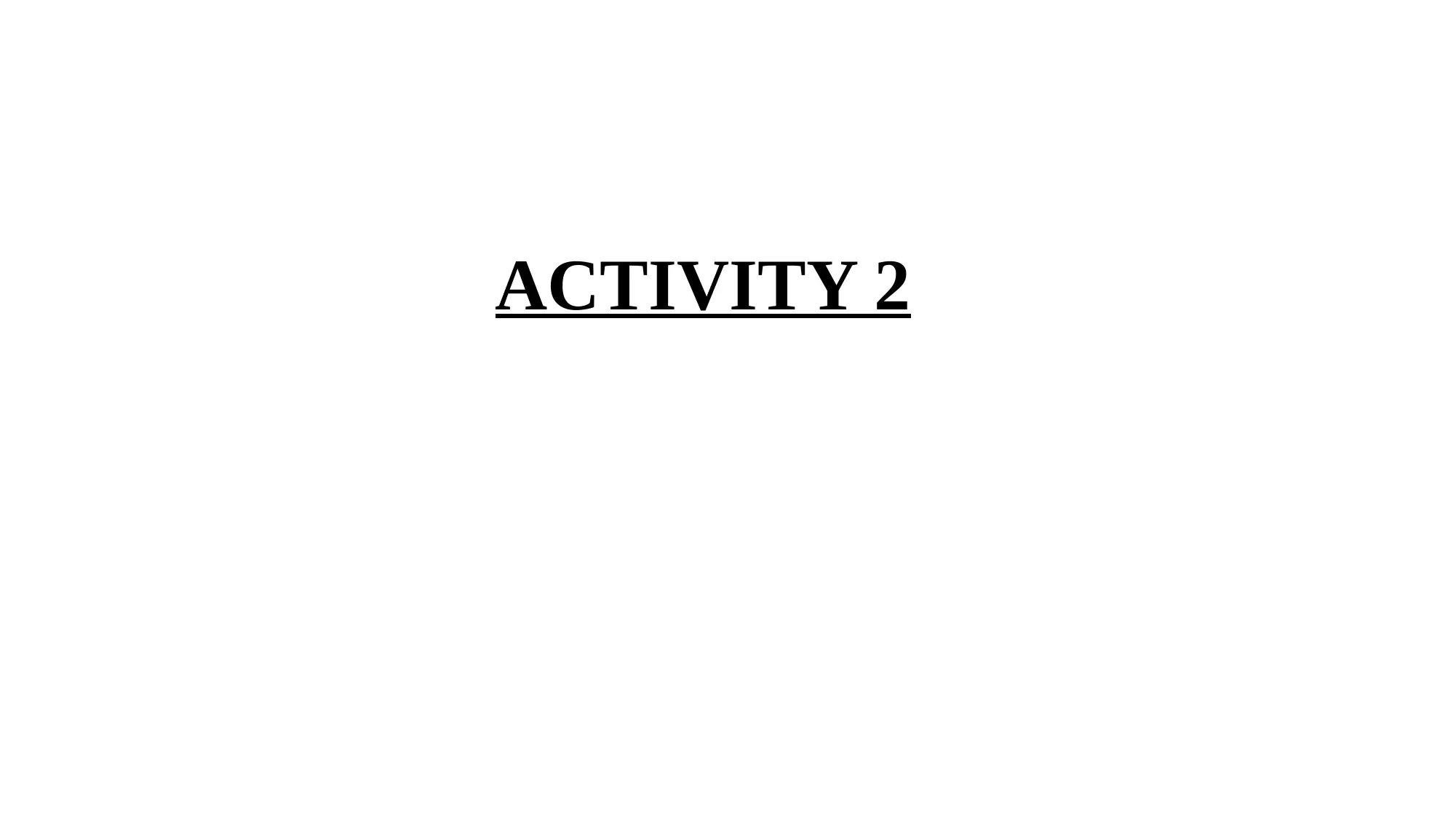
ACTIVITY 2
Paraphrase This Document
Need a fresh take? Get an instant paraphrase of this document with our AI Paraphraser
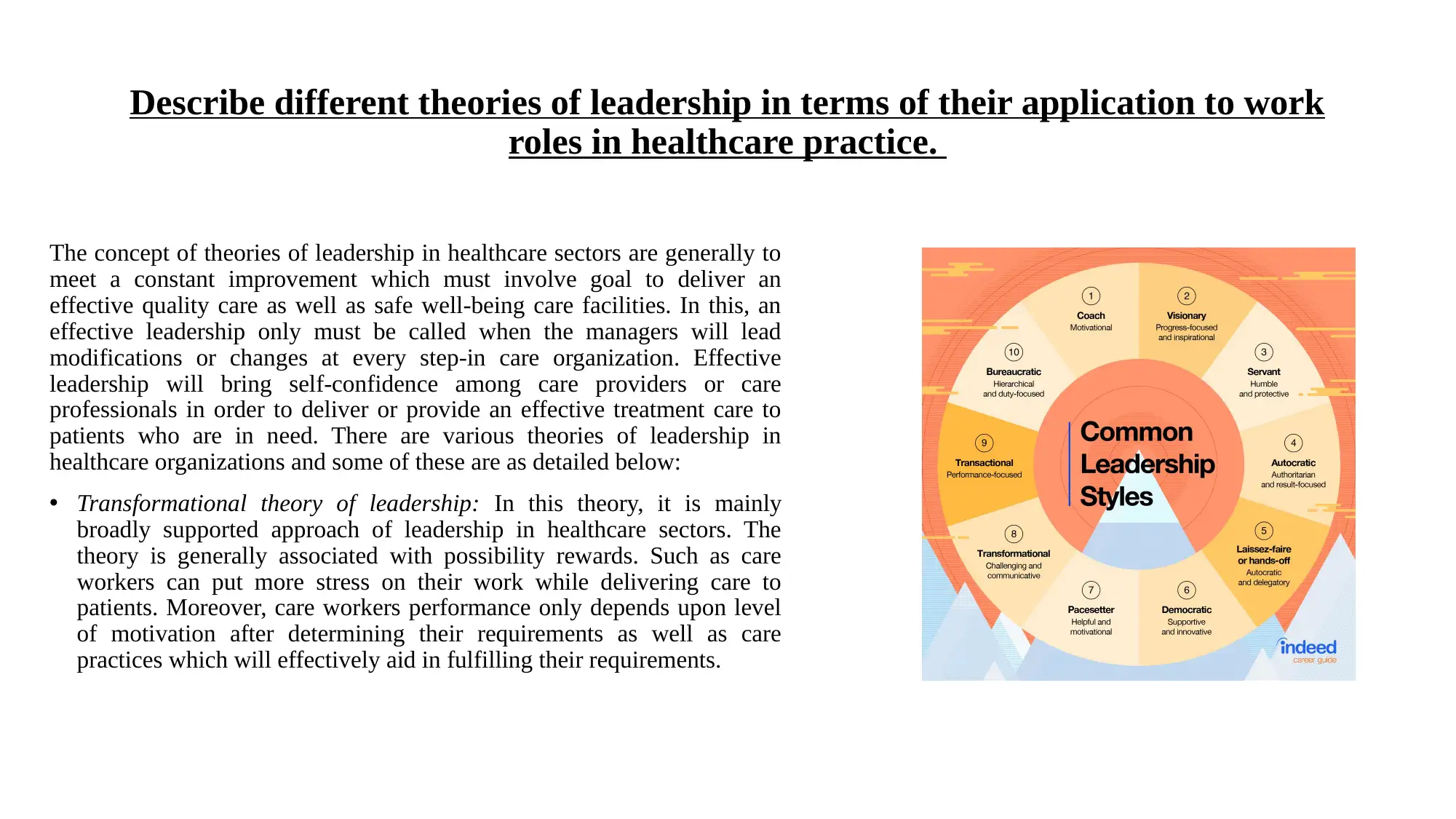
Describe different theories of leadership in terms of their application to work
roles in healthcare practice.
The concept of theories of leadership in healthcare sectors are generally to
meet a constant improvement which must involve goal to deliver an
effective quality care as well as safe well-being care facilities. In this, an
effective leadership only must be called when the managers will lead
modifications or changes at every step-in care organization. Effective
leadership will bring self-confidence among care providers or care
professionals in order to deliver or provide an effective treatment care to
patients who are in need. There are various theories of leadership in
healthcare organizations and some of these are as detailed below:
• Transformational theory of leadership: In this theory, it is mainly
broadly supported approach of leadership in healthcare sectors. The
theory is generally associated with possibility rewards. Such as care
workers can put more stress on their work while delivering care to
patients. Moreover, care workers performance only depends upon level
of motivation after determining their requirements as well as care
practices which will effectively aid in fulfilling their requirements.
roles in healthcare practice.
The concept of theories of leadership in healthcare sectors are generally to
meet a constant improvement which must involve goal to deliver an
effective quality care as well as safe well-being care facilities. In this, an
effective leadership only must be called when the managers will lead
modifications or changes at every step-in care organization. Effective
leadership will bring self-confidence among care providers or care
professionals in order to deliver or provide an effective treatment care to
patients who are in need. There are various theories of leadership in
healthcare organizations and some of these are as detailed below:
• Transformational theory of leadership: In this theory, it is mainly
broadly supported approach of leadership in healthcare sectors. The
theory is generally associated with possibility rewards. Such as care
workers can put more stress on their work while delivering care to
patients. Moreover, care workers performance only depends upon level
of motivation after determining their requirements as well as care
practices which will effectively aid in fulfilling their requirements.
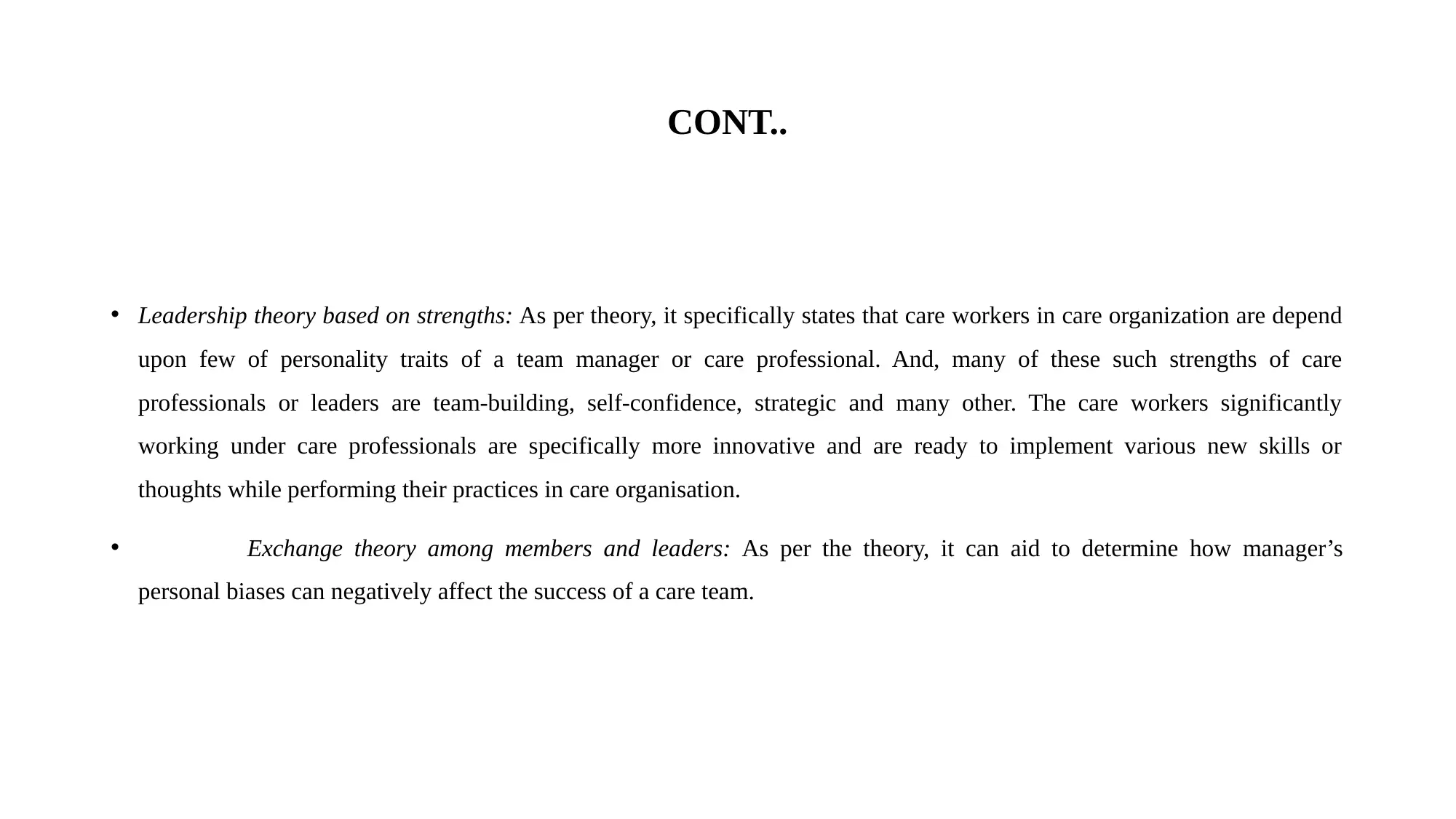
CONT..
• Leadership theory based on strengths: As per theory, it specifically states that care workers in care organization are depend
upon few of personality traits of a team manager or care professional. And, many of these such strengths of care
professionals or leaders are team-building, self-confidence, strategic and many other. The care workers significantly
working under care professionals are specifically more innovative and are ready to implement various new skills or
thoughts while performing their practices in care organisation.
• Exchange theory among members and leaders: As per the theory, it can aid to determine how manager’s
personal biases can negatively affect the success of a care team.
• Leadership theory based on strengths: As per theory, it specifically states that care workers in care organization are depend
upon few of personality traits of a team manager or care professional. And, many of these such strengths of care
professionals or leaders are team-building, self-confidence, strategic and many other. The care workers significantly
working under care professionals are specifically more innovative and are ready to implement various new skills or
thoughts while performing their practices in care organisation.
• Exchange theory among members and leaders: As per the theory, it can aid to determine how manager’s
personal biases can negatively affect the success of a care team.
⊘ This is a preview!⊘
Do you want full access?
Subscribe today to unlock all pages.

Trusted by 1+ million students worldwide
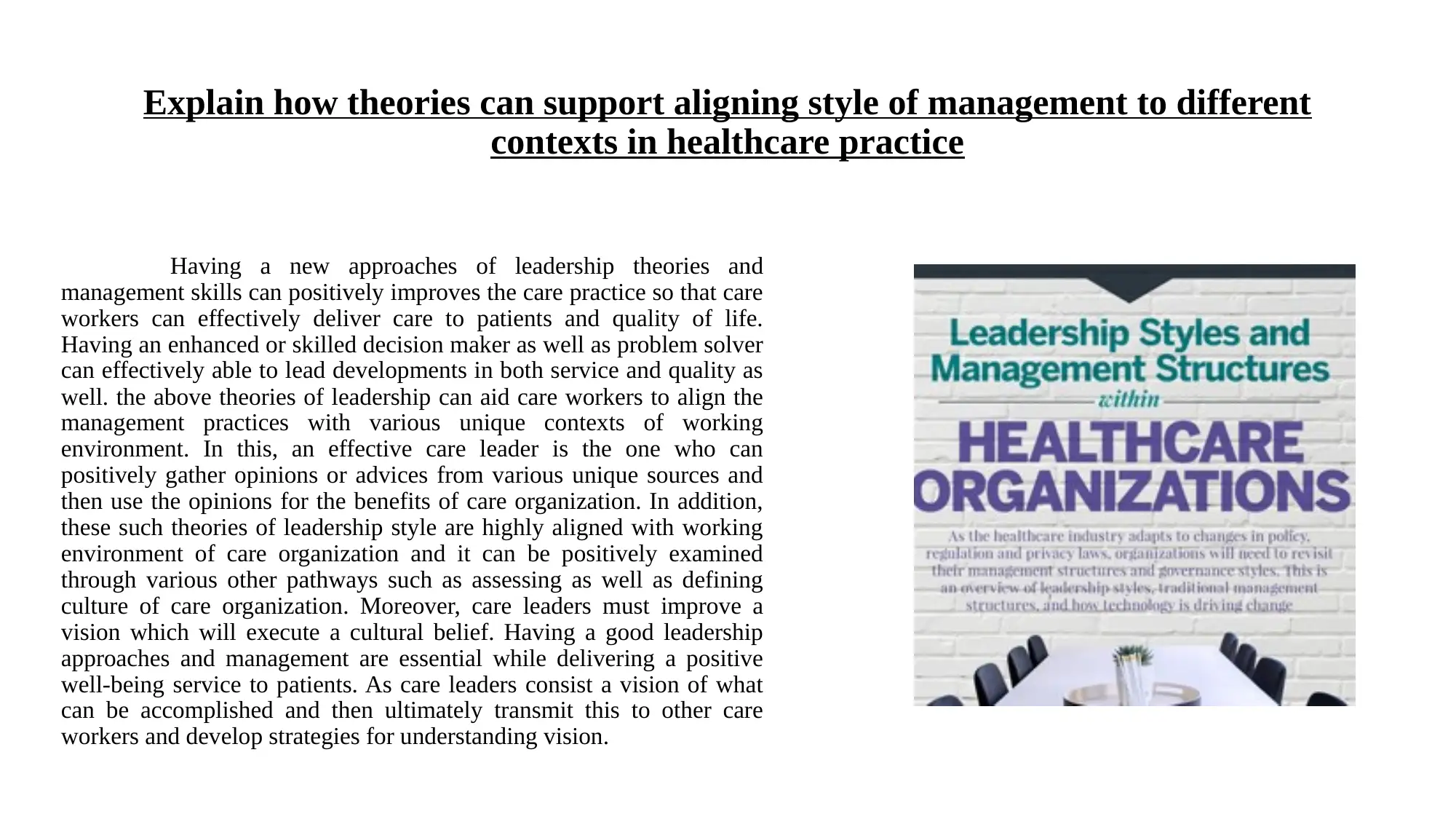
Explain how theories can support aligning style of management to different
contexts in healthcare practice
Having a new approaches of leadership theories and
management skills can positively improves the care practice so that care
workers can effectively deliver care to patients and quality of life.
Having an enhanced or skilled decision maker as well as problem solver
can effectively able to lead developments in both service and quality as
well. the above theories of leadership can aid care workers to align the
management practices with various unique contexts of working
environment. In this, an effective care leader is the one who can
positively gather opinions or advices from various unique sources and
then use the opinions for the benefits of care organization. In addition,
these such theories of leadership style are highly aligned with working
environment of care organization and it can be positively examined
through various other pathways such as assessing as well as defining
culture of care organization. Moreover, care leaders must improve a
vision which will execute a cultural belief. Having a good leadership
approaches and management are essential while delivering a positive
well-being service to patients. As care leaders consist a vision of what
can be accomplished and then ultimately transmit this to other care
workers and develop strategies for understanding vision.
contexts in healthcare practice
Having a new approaches of leadership theories and
management skills can positively improves the care practice so that care
workers can effectively deliver care to patients and quality of life.
Having an enhanced or skilled decision maker as well as problem solver
can effectively able to lead developments in both service and quality as
well. the above theories of leadership can aid care workers to align the
management practices with various unique contexts of working
environment. In this, an effective care leader is the one who can
positively gather opinions or advices from various unique sources and
then use the opinions for the benefits of care organization. In addition,
these such theories of leadership style are highly aligned with working
environment of care organization and it can be positively examined
through various other pathways such as assessing as well as defining
culture of care organization. Moreover, care leaders must improve a
vision which will execute a cultural belief. Having a good leadership
approaches and management are essential while delivering a positive
well-being service to patients. As care leaders consist a vision of what
can be accomplished and then ultimately transmit this to other care
workers and develop strategies for understanding vision.
Paraphrase This Document
Need a fresh take? Get an instant paraphrase of this document with our AI Paraphraser
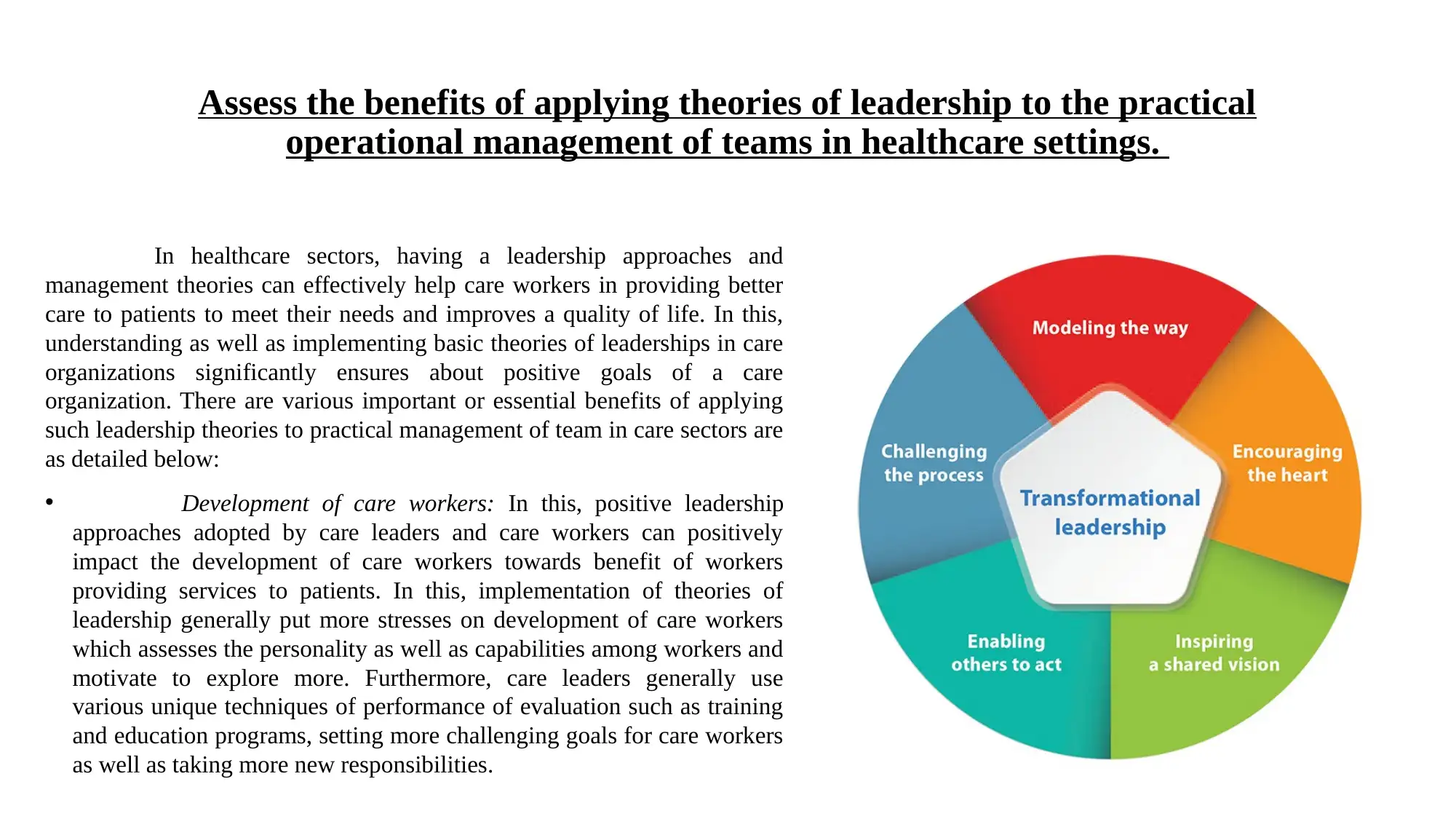
Assess the benefits of applying theories of leadership to the practical
operational management of teams in healthcare settings.
In healthcare sectors, having a leadership approaches and
management theories can effectively help care workers in providing better
care to patients to meet their needs and improves a quality of life. In this,
understanding as well as implementing basic theories of leaderships in care
organizations significantly ensures about positive goals of a care
organization. There are various important or essential benefits of applying
such leadership theories to practical management of team in care sectors are
as detailed below:
• Development of care workers: In this, positive leadership
approaches adopted by care leaders and care workers can positively
impact the development of care workers towards benefit of workers
providing services to patients. In this, implementation of theories of
leadership generally put more stresses on development of care workers
which assesses the personality as well as capabilities among workers and
motivate to explore more. Furthermore, care leaders generally use
various unique techniques of performance of evaluation such as training
and education programs, setting more challenging goals for care workers
as well as taking more new responsibilities.
operational management of teams in healthcare settings.
In healthcare sectors, having a leadership approaches and
management theories can effectively help care workers in providing better
care to patients to meet their needs and improves a quality of life. In this,
understanding as well as implementing basic theories of leaderships in care
organizations significantly ensures about positive goals of a care
organization. There are various important or essential benefits of applying
such leadership theories to practical management of team in care sectors are
as detailed below:
• Development of care workers: In this, positive leadership
approaches adopted by care leaders and care workers can positively
impact the development of care workers towards benefit of workers
providing services to patients. In this, implementation of theories of
leadership generally put more stresses on development of care workers
which assesses the personality as well as capabilities among workers and
motivate to explore more. Furthermore, care leaders generally use
various unique techniques of performance of evaluation such as training
and education programs, setting more challenging goals for care workers
as well as taking more new responsibilities.
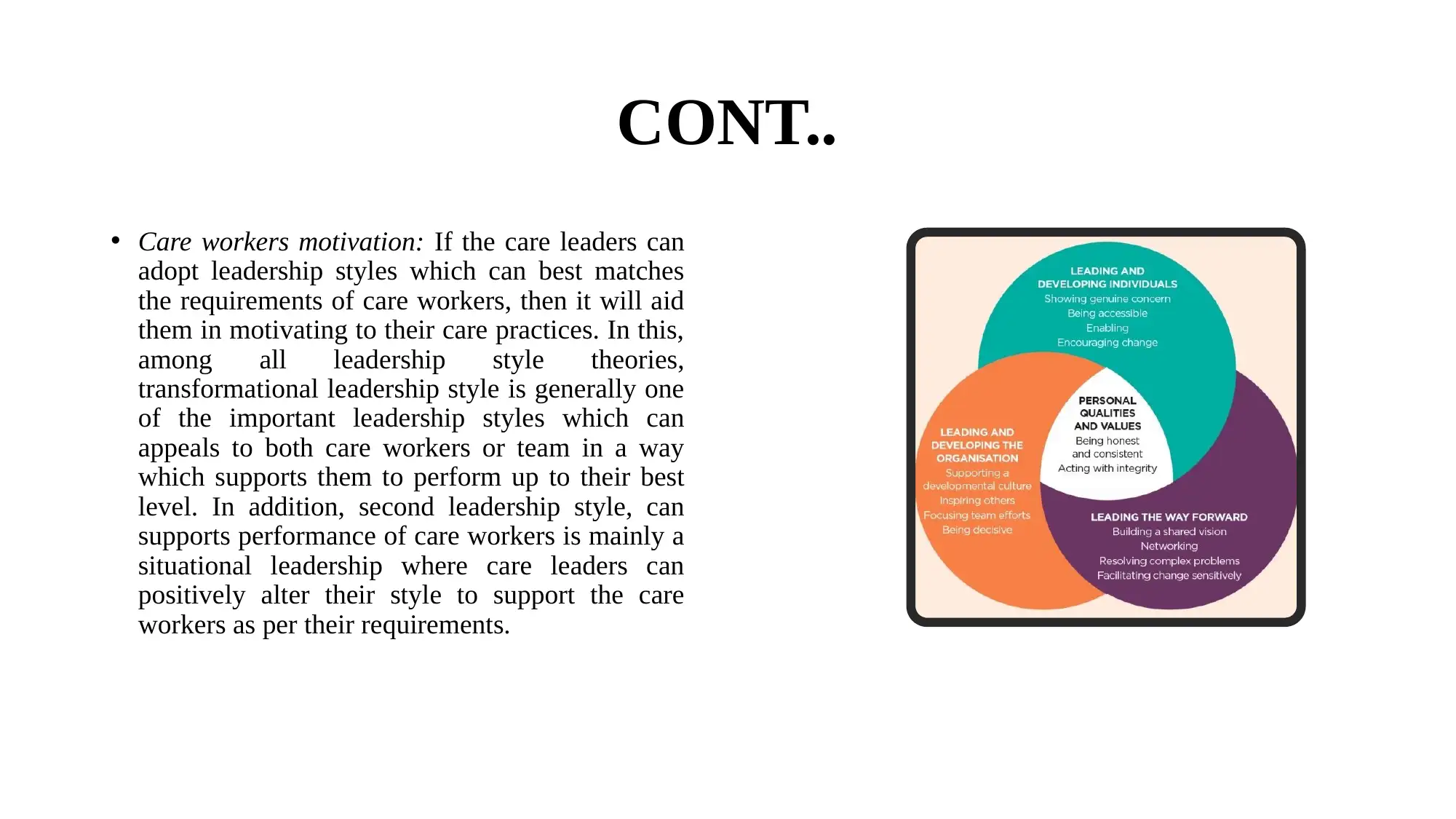
CONT..
• Care workers motivation: If the care leaders can
adopt leadership styles which can best matches
the requirements of care workers, then it will aid
them in motivating to their care practices. In this,
among all leadership style theories,
transformational leadership style is generally one
of the important leadership styles which can
appeals to both care workers or team in a way
which supports them to perform up to their best
level. In addition, second leadership style, can
supports performance of care workers is mainly a
situational leadership where care leaders can
positively alter their style to support the care
workers as per their requirements.
• Care workers motivation: If the care leaders can
adopt leadership styles which can best matches
the requirements of care workers, then it will aid
them in motivating to their care practices. In this,
among all leadership style theories,
transformational leadership style is generally one
of the important leadership styles which can
appeals to both care workers or team in a way
which supports them to perform up to their best
level. In addition, second leadership style, can
supports performance of care workers is mainly a
situational leadership where care leaders can
positively alter their style to support the care
workers as per their requirements.
⊘ This is a preview!⊘
Do you want full access?
Subscribe today to unlock all pages.

Trusted by 1+ million students worldwide
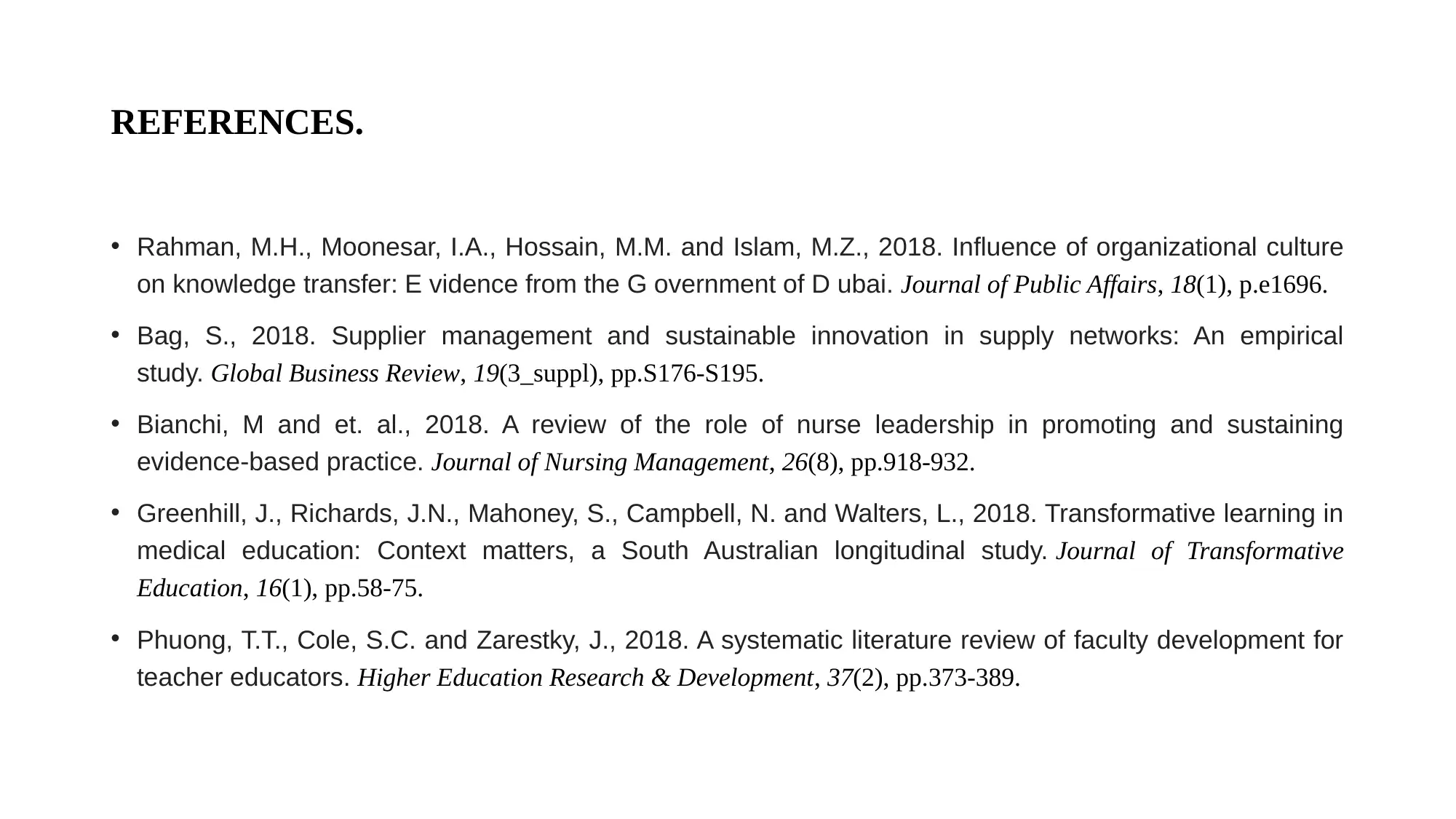
REFERENCES.
• Rahman, M.H., Moonesar, I.A., Hossain, M.M. and Islam, M.Z., 2018. Influence of organizational culture
on knowledge transfer: E vidence from the G overnment of D ubai. Journal of Public Affairs, 18(1), p.e1696.
• Bag, S., 2018. Supplier management and sustainable innovation in supply networks: An empirical
study. Global Business Review, 19(3_suppl), pp.S176-S195.
• Bianchi, M and et. al., 2018. A review of the role of nurse leadership in promoting and sustaining
evidence‐based practice. Journal of Nursing Management, 26(8), pp.918-932.
• Greenhill, J., Richards, J.N., Mahoney, S., Campbell, N. and Walters, L., 2018. Transformative learning in
medical education: Context matters, a South Australian longitudinal study. Journal of Transformative
Education, 16(1), pp.58-75.
• Phuong, T.T., Cole, S.C. and Zarestky, J., 2018. A systematic literature review of faculty development for
teacher educators. Higher Education Research & Development, 37(2), pp.373-389.
• Rahman, M.H., Moonesar, I.A., Hossain, M.M. and Islam, M.Z., 2018. Influence of organizational culture
on knowledge transfer: E vidence from the G overnment of D ubai. Journal of Public Affairs, 18(1), p.e1696.
• Bag, S., 2018. Supplier management and sustainable innovation in supply networks: An empirical
study. Global Business Review, 19(3_suppl), pp.S176-S195.
• Bianchi, M and et. al., 2018. A review of the role of nurse leadership in promoting and sustaining
evidence‐based practice. Journal of Nursing Management, 26(8), pp.918-932.
• Greenhill, J., Richards, J.N., Mahoney, S., Campbell, N. and Walters, L., 2018. Transformative learning in
medical education: Context matters, a South Australian longitudinal study. Journal of Transformative
Education, 16(1), pp.58-75.
• Phuong, T.T., Cole, S.C. and Zarestky, J., 2018. A systematic literature review of faculty development for
teacher educators. Higher Education Research & Development, 37(2), pp.373-389.
1 out of 7
Related Documents
Your All-in-One AI-Powered Toolkit for Academic Success.
+13062052269
info@desklib.com
Available 24*7 on WhatsApp / Email
![[object Object]](/_next/static/media/star-bottom.7253800d.svg)
Unlock your academic potential
Copyright © 2020–2026 A2Z Services. All Rights Reserved. Developed and managed by ZUCOL.





